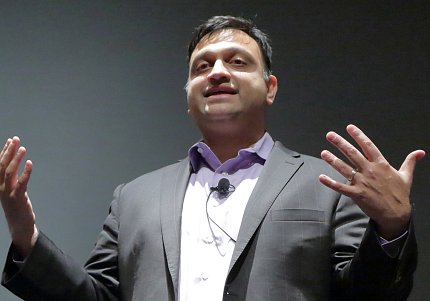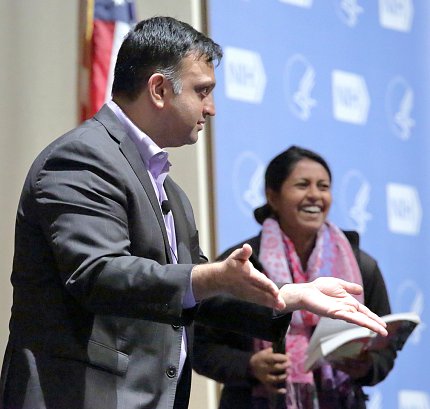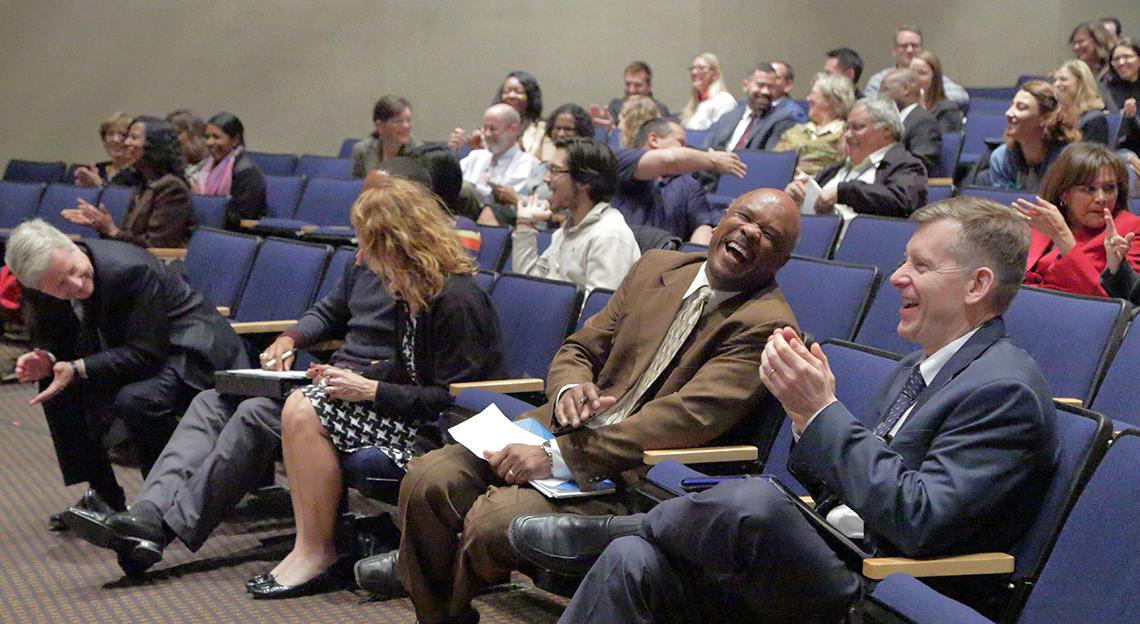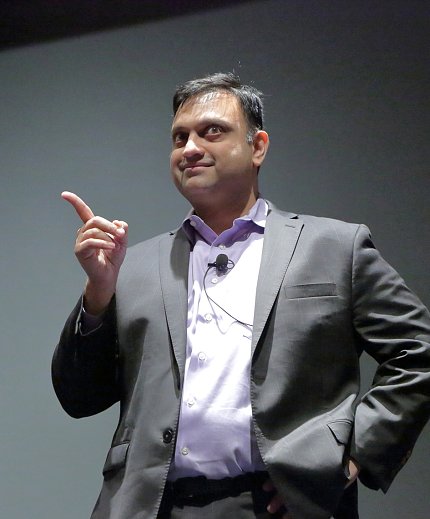Since Worklife Is Unscripted
Planning to Handle the Unplanned Like a Pro

Photo: Ernie Branson
How good are you at handling a sudden change in plans? What if your success at work depended on it? At a recent Deputy Director for Management Seminar, the self-described “world’s only motivational improviser” Avish Parashar offered a few suggestions.
“Life isn’t scripted—no matter how much we want it to be, with our agendas and our to-do lists and our productivity apps and our big-picture vision boards,” he said, holding up a concierge-style bell. “Life is the ultimate improvisation. Just when you think you’ve got it all figured out, the universe comes in and goes, ‘DING! Now deal with this.’ Sometimes ‘ding’ happens.”
Learning a few techniques to make better snap decisions can help everyone in every situation, Parashar noted.
“We all have those moments,” he said, “where because we are angry, frustrated, stressed, overworked or just not thinking, where we end up doing or saying something less than optimal that ends up making our lives more complicated than they need to be.”

Photo: Ernie Branson
Work and the goals you set for your organization can benefit from a little positive improvisation as well.
“Our lives are nothing but a series of moments,” Parashar pointed out. “If we make good decisions in those moments, life gets easier and more successful. If we make bad decisions, life becomes more of a struggle.
“Anyone can do well when everything goes according to plan,” he continued. “The real test—and I would say your value to your organization—is how quickly and effectively you respond when things don’t go according to plan…These skills are more valuable now than ever simply because the world is changing faster than it ever has before…The key is responding. It’s not what happens, it’s how you respond.”
Parashar described three levels of response: improvise, adapt and innovate.
In straight improv—call it beginner’s improv— Parashar said you learn to take on an improviser’s mindset: “Have fun. Be willing to fail. Focus on what you can control and let go of the rest.”
Using games and volunteers from the Masur Auditorium audience, the professional improviser admitted it’s not always easy.
“Ding moments aren’t fun,” he said. “They throw us off course…Failure does have consequences, but fear of failure will do nothing but paralyze you, cut off your creativity when you need it most…Bring a positive energy to it…If in those moments of stress and change you can step back, have fun, it’s going to open up your resources quicker.”
A level two response goes beyond merely reacting. “Adapting” requires more assertive action. “Every ding moment has an opportunity within it,” Parashar explained. “Great improvisers learn how to find and take advantage of those opportunities.”
For most of us, the temptation when facing change is to wish for the way things used to be, he said. However, “you can never make progress looking backwards. The more time we spend wishing things could be like they were before, the less energy we’re putting toward making this new reality even better.”

Photo: Ernie Branson
Adaptability works in increments, step by step, Parashar noted. And the steps don’t have to be all that large. “If you can think of your actions as experiments instead of solutions, you will make much faster progress,” he said. “Take small steps. See what happens. Then adjust.”
Finally, Parashar said, comes master-level improvisation: Innovation. That’s when you don’t wait for change to happen to you, but decide yourself to head in another direction. “Create your own ding moments that change the game and propel you forward,” he suggested to those who feel they or their program may be stuck in a rut. “Do something new or do something old in a new way.”

Photo: Ernie Branson
Parashar even has a sort of script for changing your script. When a colleague or coworker comes to you with what may seem like a cockamamie proposal, the professional improv guy wants you to “say ‘yes and’ instead of ‘yes but.’”
Really, Parashar said, it’s more of a mindset, an attitude that changes the energy of the conversation from negative and constrictive to expansive and collaborative.
“This is not a literal technique,” he explained. “It’s a mentality…We’re talking about ding moments and default responses. For so many, the default response to anything unexpected, different, new, out-of-our-comfort-zone, not-how-we-originally-wanted-it-to-be is to immediately say, ‘yes but.’ All I’m suggesting is that we can reap some tremendous benefits if we switch our default response to ‘yes and.’”
Such an approach not only changes the dynamic of the interaction, but also helps the relationship. “[The more positive attitude] heads off conflict, opens up creativity,” he said. “[NIH] is a place of creativity. ‘Yes and’ drives it.”
Concluding the lively, humor-filled seminar, Parashar urged attendees to use improvisation boldly for it to be most effective. “You must say ‘yes and’ even to ideas that seem impossible.” After all, anyone can approve a good idea. “Sometimes the best ideas are hiding behind the worst ones.”
